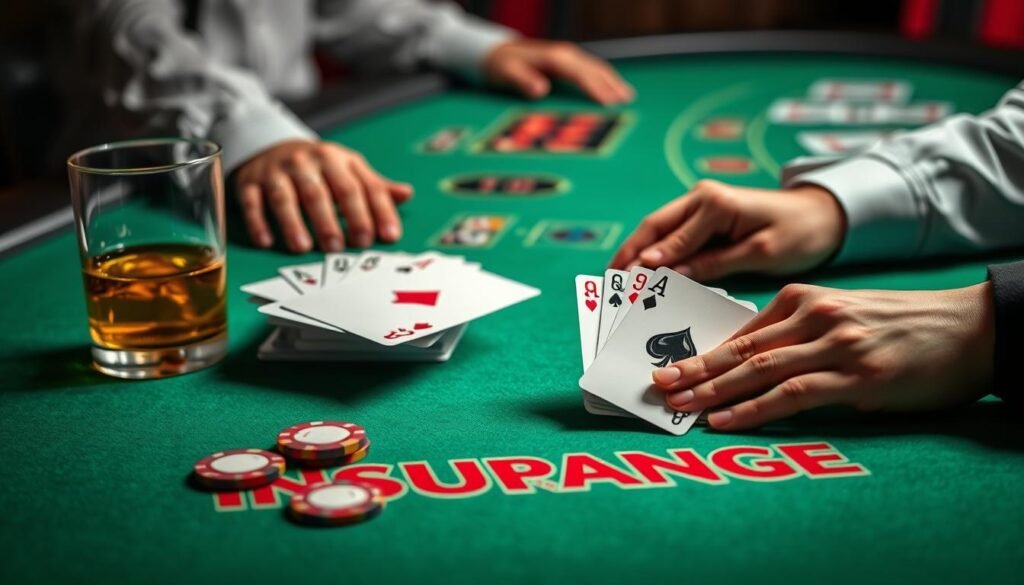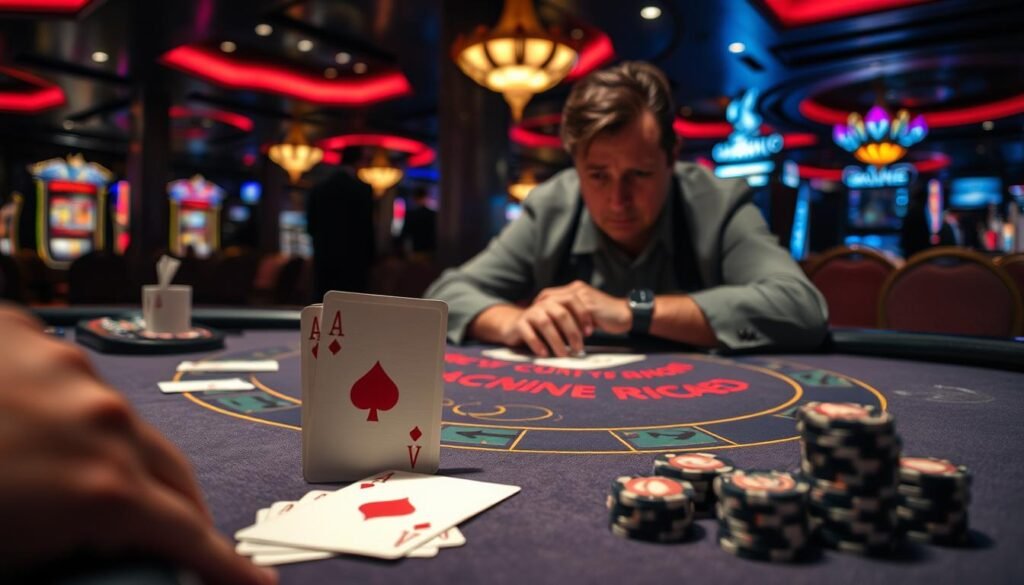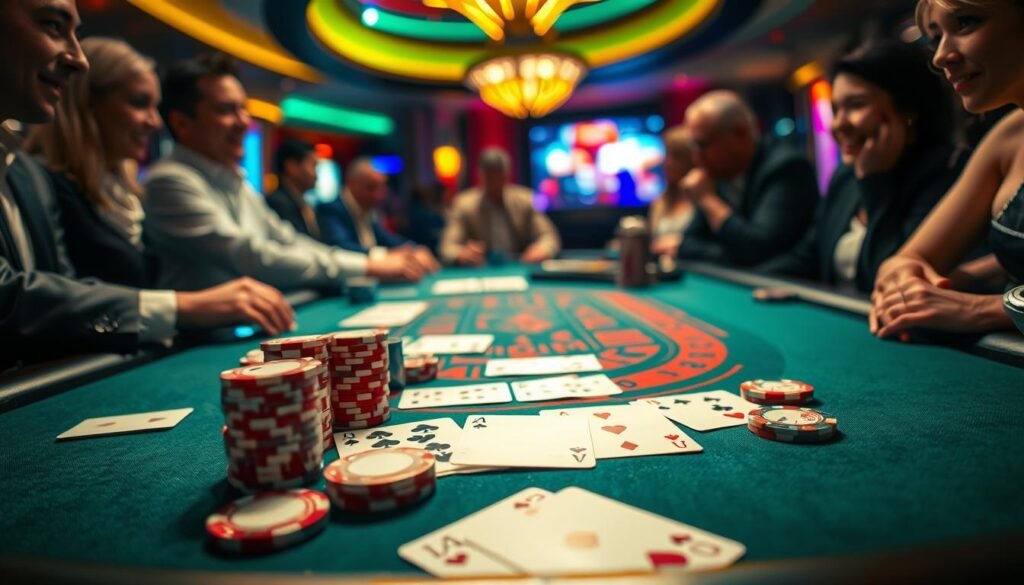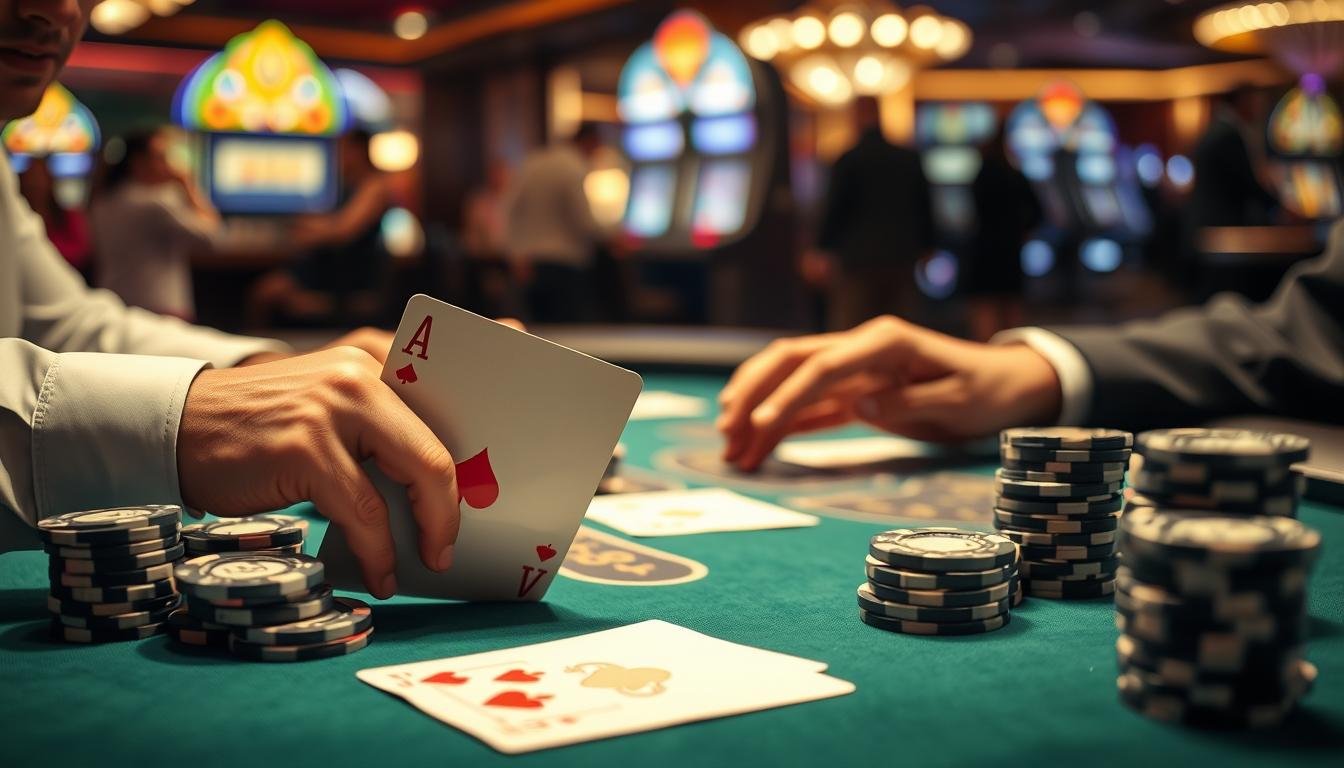Ever thought about whether taking insurance in blackjack is a good idea or a risk? We’ll dive into the details of blackjack insurance. You’ll learn when it’s a smart choice. Get ready to boost your chances at the blackjack table!
Key Takeaways
- Blackjack insurance is a side bet that pays 2-1 if the dealer has a natural blackjack (21).
- The house edge for insurance bets is 8.5%, making it a generally unfavorable bet for players.
- Insurance is only recommended in specific scenarios, such as when you have a strong hand and the dealer’s upcard is an ace.
- Understanding the probabilities and odds of insurance bets can help you make more informed decisions at the blackjack table.
- Practicing with insurance bets through online blackjack games can improve your understanding of when to use this strategy.
Ready to find out the truth about blackjack insurance? Learn how to use it to your advantage. Let’s explore this fascinating side bet together!
Understanding Blackjack Insurance
In the world of blackjack, there’s a special betting option called blackjack insurance. It’s a side bet that players can make when the dealer’s upcard is an Ace. This bet helps protect against the dealer getting a blackjack.
What is Blackjack Insurance?
Blackjack insurance is a bet made when the dealer’s visible card is an Ace. If the dealer gets a blackjack, the insurance bet wins at 2-to-1 odds. But, if the dealer doesn’t get a blackjack, the player loses the insurance bet.
While it might seem like a good idea to protect your bet, it’s actually a poor long-term strategy. The odds of the dealer getting a blackjack with an Ace showing are about 31%, or 9:4. This means the insurance bet has a negative expected value, leading to a net loss for the player over time.
| Statistic | Value |
|---|---|
| Odds of Dealer Blackjack with Ace Showing | 31% or 9:4 |
| Expected Value of Insurance Bet | Negative |
| Dealer Blackjack Probability (Single Deck) | 4.83% |
| Expected Value of Insurance Bet (Single Deck) | -8.75% |
| Chance of Hitting 10 or Picture Card | 30% |
Most of the time, taking insurance in blackjack is not a smart move to increase your chances of winning. The odds are usually against the player. Experienced players often see it as a distraction from a solid blackjack strategy.
When to Take Insurance
In blackjack, deciding to take insurance can be tough. It’s good to know when it might help, but also the risks. Let’s look at when taking insurance in blackjack might be smart.
Insurance can be helpful if the dealer’s upcard is an Ace. This raises the chance of the dealer having a blackjack. Taking insurance can reduce losses if the dealer does have a blackjack.
Also, if you have a weak hand, like 16 or less, insurance might be a good choice. It can protect your main bet if the dealer gets a blackjack.
But, the odds of winning the insurance bet in blackjack are 9/4 against the player. The house edge is almost 6 percent. So, in the long run, insurance is not usually a good bet for players.
However, if you have a strong hand, like a hard 17 or higher, and the dealer’s upcard is an Ace, insurance might be a better choice. Winning is winning, but not taking even money can make you 3 percent better off in the long run.
So, whether to take insurance in blackjack depends on your hand, the dealer’s upcard, and your blackjack insurance strategy. It’s all about making smart blackjack decision making.

How does insurance work in blackjack
The Mechanics of Insurance Bets
In blackjack, players can place an insurance bet when the dealer’s upcard is an Ace. This bet is half the size of the original wager. It pays out 2-to-1 if the dealer has a blackjack.
If the dealer doesn’t have a blackjack, the insurance bet is lost. But the original bet stays in the game. The house edge on insurance bets is about 3%, giving the casino an edge over players.
Some players might take insurance with a strong hand and an Ace upcard. It can help reduce losses if the dealer has a blackjack. Yet, insurance bets are often seen as a bad wager because of the low chance of the dealer having a blackjack.
| Statistic | Value |
|---|---|
| Probability of Dealer Blackjack with Ace Upcard | 31.5% |
| Expected Return on Insurance Bet | -48.7% |
| House Edge on Insurance Bet | 8.5% |
| Insurance Bet Payout | 2:1 |
In summary, the insurance bet in blackjack is a way to hedge bets when the dealer’s upcard is an Ace. But it has a big house advantage and is not recommended for most players.
Risks of Taking Insurance
Insurance bets in blackjack can be risky. They are side bets that the dealer has a blackjack. These bets have several disadvantages that make them not good for players.
First, taking insurance always costs money, even if the dealer has a blackjack. The bet only wins if the dealer has a blackjack, which is rare. It also only helps the player’s hand, not all hands at the table.
Another risk is that insurance is a bet on something the player can’t control. It’s more like a gamble than a sure win. Statistics show blackjack insurance is a bad bet, with a house edge of 8.5%.
“Winning insurance payouts are offered at 2:1, but the probability of the dealer having a 10 in the hole when the player has a blackjack and the dealer has an ace up is only 30.7%, while the chances of the dealer having an ace to 9 in the hole is 69.3%.”
Considering these odds, the risks of insurance bets in blackjack are too high. Blackjack insurance disadvantages include losing the insurance bet and a higher house edge. It’s best to avoid insurance unless you’re very sure the dealer has a blackjack.

The Odds of Insurance Bets
Understanding the odds of blackjack insurance is key. The dealer has a blackjack about 31.5% of the time when showing an ace. This leads to a loss of 48.7% of the time and a win of 31.5% of the time.
The casino house edge on insurance bets is a whopping 8.5%. This high edge makes insurance bets not good for players over time. It’s wise not to take insurance unless you’re sure the dealer has a blackjack.
Calculating the Probability
The probability of dealer blackjack changes with the number of decks and the player’s hand. With one deck, the dealer’s chance of a blackjack is higher. But, with more decks, the player’s odds drop.
| Scenario | Probability of Dealer Blackjack |
|---|---|
| Single deck, player has no 10-value card | 2.0625 to 1 |
| Single deck, player has a 10-value card | 2.5 to 1 |
| Multi-deck, player has no 10-value card | Approximately 2.2 to 1 |
The probability of dealer blackjack and blackjack insurance odds change with the game. Knowing these odds helps players decide on insurance bets.
Blackjack Strategy and Insurance
Learning when to take insurance is key in blackjack strategy, especially for advanced players. Those who know blackjack basic strategy and card counting techniques might see when insurance is smart. But, for most, insurance bets usually lead to a loss, with a 6 percent house edge.
Unless you’re sure the dealer has a blackjack, it’s wise to skip insurance bets. Instead, aim for the best optimal blackjack play. The odds of winning an insurance bet are against you, making it a bad choice for most. Casinos also offer blackjack surrender, where you can get back half your bet in some cases.
Remember, different casinos have their own rules, like payouts for naturals and side bets. Knowing these rules helps you make better decisions at the table.

While knowing about insurance is useful, most players should focus on the basics. Mastering blackjack basic strategy and card counting techniques will help you win more in the long run.
Online Blackjack and Insurance
Online gambling keeps growing, and blackjack fans have many online blackjack variations to try. These come from different blackjack software providers. Insurance side bets are common in games like American and European blackjack.
Playing with Insurance Online
Insurance bets are available in live dealer blackjack games. Here, players can chat with real dealers. But, it’s wise to be careful with insurance bets online, especially when betting real money.
For those curious about insurance bets, start with free games. This way, you can learn the rules and odds without losing money.
Insurance bets usually don’t pay off well. On average, players lose more than half of their bets. This is because the dealer only gets blackjack about 30% of the time when showing an Ace. So, betting too much on insurance can lead to big losses.
Deciding to use insurance should be a careful choice. Know the risks and odds well. With caution and strategy, you can make smart bets that fit your blackjack plan.
Conclusion
Blackjack insurance is a side bet that protects you if the dealer gets a blackjack. It might seem like a good idea, especially with an Ace up. But, the odds are usually against you.
Insurance bets have a high house edge. The chance of the dealer getting a blackjack is low. So, it’s wise to think twice before taking insurance.
Unless you have a strong hand and are sure the dealer has a blackjack, it’s best to skip insurance. Knowing the risks helps you make better choices. This way, you can follow blackjack insurance summary and blackjack insurance best practices more effectively.
Managing your bankroll well is key in blackjack, with or without insurance. Smart decisions and strategies lead to a fun and possibly profitable game.
FAQ
What is blackjack insurance?
Blackjack insurance is a side bet you can make when the dealer shows an Ace. It pays 2-1 if the dealer gets a natural blackjack (21).
When should I take insurance in blackjack?
Taking insurance is usually a bad move. The dealer’s chance of having a blackjack is low. But, it might be worth it if you have a weak hand and the dealer shows an Ace. Or, if you have a strong hand and think the dealer has a blackjack.
How do insurance bets work in blackjack?
If the dealer’s upcard is an Ace, you can place an insurance bet. It’s half the size of your original bet. It pays 2-to-1 if the dealer has a blackjack.
What are the risks of taking insurance in blackjack?
Taking insurance risks losing the bet if the dealer doesn’t have a blackjack. It only protects your hand, not others at the table.
What are the odds of winning an insurance bet in blackjack?
The chance of the dealer having a blackjack with an Ace up is about 31.5%. This means the insurance bet has a -48.7% expected return. The house edge is 8.5%, making it a bad bet for most.
How does blackjack insurance fit into overall strategy?
Knowing when to take insurance is key for a good blackjack strategy. But, for most players, insurance bets lead to losses over time.
Can I find blackjack insurance in online games?
Yes, you can find insurance bets in online blackjack games. This includes American and European blackjack. But, be careful with this side bet in real-money games.
